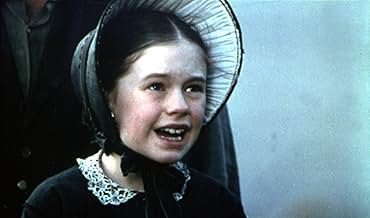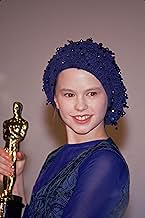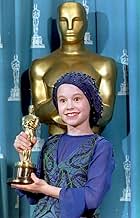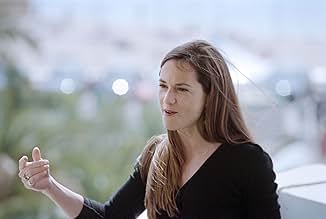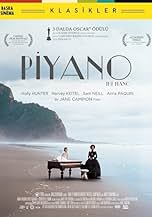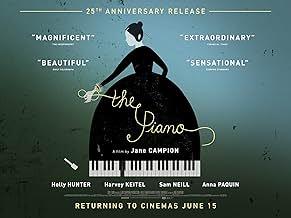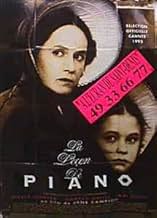Eine stumme Frau wird in den 50er-Jahren des 19. Jahrhunderts nach Neuseeland geschickt, zusammen mit einem wertvollen Klavier und ihrer Tochter, die dort einen wohlhabenden Grundbesitzer he... Alles lesenEine stumme Frau wird in den 50er-Jahren des 19. Jahrhunderts nach Neuseeland geschickt, zusammen mit einem wertvollen Klavier und ihrer Tochter, die dort einen wohlhabenden Grundbesitzer heiraten soll, bald aber heftig von einem einheimischen Plantagenarbeiter umworben wird.Eine stumme Frau wird in den 50er-Jahren des 19. Jahrhunderts nach Neuseeland geschickt, zusammen mit einem wertvollen Klavier und ihrer Tochter, die dort einen wohlhabenden Grundbesitzer heiraten soll, bald aber heftig von einem einheimischen Plantagenarbeiter umworben wird.
- 3 Oscars gewonnen
- 65 Gewinne & 57 Nominierungen insgesamt
- Nessie
- (as Genevieve Lemon)
Empfohlene Bewertungen
I believe it would be wrong to assume that any of the characters are martyrs in this tragic story, nor would it be right to think Sam Neill's character a villain. You may think this is crazy, but I think the piano itself serves as both a good and bad omen for all that are involved. I would relate it to a "Pandora's box" of sorts, a treasure that exposes all the evil and sin in the world, but which also provides hope as well. The piano is Ada's sounding box, a tool that allows her to escape from a world that does not understand her, but that also threatens her moral compass, removing her from marital conventions and forces her to lose herself.
The performances in "The Piano" are particularly good, especially Holly Hunter's. It is interesting to note that all of Hunter's piano playing in the film is actually Hunter herself performing in front of us. You can visually and aurally feel the mood of Hunter's character through the music she plays. We the audience lose ourselves right along with her, lost upon a sea of music. We see why Keitel becomes enamored by her, and why Neill becomes overcome with jealousy and betrayal. Not many films would allow us to enter the emotions of all three main characters, but this film is truly an exception.
Rarely do we witness real beauty captured on film. "The Piano" is such a visually stunning film, it's almost intoxicating how its atmosphere sweeps across the screen. This landscape is equaled by the performances, bringing understanding and mystery to this wonder. Sometimes symbolism of this nature can be distracting to an audience. "The Piano" dares to follow this symbolic path, and hits a bullseye with full emotional force. Rating: Four stars.
Repulsed by Baines' crude appearance, Ada reluctantly accepts the deal to play the piano in his hut while he does "things". Submerged erotic desires and passion slowly set free between the unlikely pair during the piano sessions. Both Baines and Stewart become obsessed by Ada's powerful, intensely suggestive form of unuttered communication. Completely bewildered, Stewart asks Baines if had ever heard Ada speak a single word to him, claiming that he could hear her voice in his mind.
The breathtaking, beautiful imagery as well as its stirring music (Michael Nyman) contribute to the romantic, mystifying atmosphere of the film. "The Piano" won the Palme d'Or at the Cannes Film Festival and Oscars for Best Actress (Holly Hunt), Best Supporting Actress (Anna Paquin), and Campion's screenplay. Holly Hunter's outstanding performance conveys impressively a woman's ability to express herself without words. "The Piano" is one of the best films I have seen so far.
Australian director Jane Campion's erotically-charged Gothic love story was a huge success back in 1993, winning the Best Actress Academy Award for Holly Hunter and Best Supporting Actress for Paquin, who became the second youngest recipient ever. Hunter's shadowy Ada is the backbone of The Piano, and while it may appear that it is her piano that fuels her passion, it is very much her own mind and experiences that dictate her actions. She is quite a fascinating character - not merely the put-upon mute who longs for love and her piano - she is actually rather subtly manipulative and sexually powerful, weighing up the two love interests in her life, and playing a dangerous power game with her increasingly jealous husband.
The contrast between the two men in Ada's life couldn't be any obvious - Stewart playing dutiful, business-minded and quite inept in courtship, while Baines is hulking, living out in the forest, his face spotted with native Maori tattoos - but it is quite clear as to where Campion's preferences life. Ada's scenes with Baines, in which he listens to her play, become the centrepiece for some highly erotic moments, playing out more like animal foreplay than anything human. Ada seems not to bat an eyelid when Baines lies on the floor by her feet, fingering a hole in her stocking, or simply walks around the room completely naked. While these unconventional actions are there to channel Ada's sexual repression/release and Baines' animalistic nature, these scenes often appear forced, filled with lazy or nonsensical metaphors passed of as spiritual film-making.
As with many Australian period films, The Piano looks stunning. The exotic location is not filmed through a sun-tinted lens, and nor does it capture any of the colourful wildlife (something you would expect if Terence Malick had directed it), but is grey, wet and muddy. Like Peter Weir's Picnic at Hanging Rock (1975) and Gallipoli (1981), it has that lived-in feel, with Hunter's beautiful, ghostly face evoking a 19th- century photograph, where everyone looks grim and pale, and Campion's occasionally snapshot approach captures the mundane, everyday actions of the period. The performances are a revelation, with Hunter and Paquin deserving their accolades, and Keitel proving a formidable presence (I'll not mention the accent). The Piano is personal film-making, but too often the film seems to be striving for that mystical atmosphere rather than actually capturing it, occasionally getting lost amongst Campion's obvious adoration for her protagonist.
www.the-wrath-of-blog.blogspot.com
It's a beautiful film to watch of course the breathtakingly beautiful misty forests and sea scapes of New Zealand . The emotional impact of Holly Hunter's Academy Award winning performance as Ada ( who doesn't have a line of dialogue except subconscious narrative ) and of course Anna Paquin as her precocious adult child daughter Flora are superb . Anna was only one year older than Tatum O'Neil the youngest Oscar winner and has had a much more impressive film career than Tatum since her win. The actors Sam Neil as Alisdair ,Ada's patient but ineffectual husband and Harvey Keitel as George Barnes the lonely overseer with a vivid fantasy emotional life are also very impressive in these roles . I did wonder if the few sexual scenes could be filmed as convincingly in today's ME Too World ? the actors would have to follow much stricter guidelines I suspect.
Finally I guess I'm writing this to encourage anyone who feels very strongly about or dislike a much praised movie to keep an open mind and give it another chance as I did the reward was worth it. Ps the music of course by Michael Nyman adds to the enjoyment but it's Director and writer Jane Campion who has produced a film where even the title "The Piano." An inanimate object becomes almost a living character that determines all the main characters fate and destiny.
Wusstest du schon
- WissenswertesHolly Hunter learned to play the piano when she was nine years old and played most of the piano sequences herself.
- PatzerPianos of the period portrayed in the film were made almost entirely of wood, no metal framing at all, and the piano would therefore float, not sink.
- Zitate
[first lines]
Ada: The voice you hear is not my speaking voice - -but my mind's voice. I have not spoken since I was six years old. No one knows why - -not even me. My father says it is a dark talent, and the day I take it into my head to stop breathing will be my last. Today he married me to a man I have not yet met. Soon my daughter and I shall join him in his own country. My husband writes that my muteness does not bother him - and hark this! He says, "God loves dumb creatures, so why not I?" 'Twere good he had God's patience, for silence affects everyone in the end. The strange thing is, I don't think myself silent. That is because of my piano. I shall miss it on the journey.
- SoundtracksThe Heart Asks Pleasure First/The Promise
Michael Nyman
Top-Auswahl
- How long is The Piano?Powered by Alexa
Details
- Erscheinungsdatum
- Herkunftsländer
- Offizieller Standort
- Sprachen
- Auch bekannt als
- El piano
- Drehorte
- Produktionsfirmen
- Weitere beteiligte Unternehmen bei IMDbPro anzeigen
Box Office
- Budget
- 7.000.000 $ (geschätzt)
- Bruttoertrag in den USA und Kanada
- 40.157.856 $
- Eröffnungswochenende in den USA und in Kanada
- 151.419 $
- 14. Nov. 1993
- Weltweiter Bruttoertrag
- 40.185.766 $
- Laufzeit
- 2 Std. 1 Min.(121 min)
- Farbe
- Sound-Mix
- Seitenverhältnis
- 1.85 : 1







